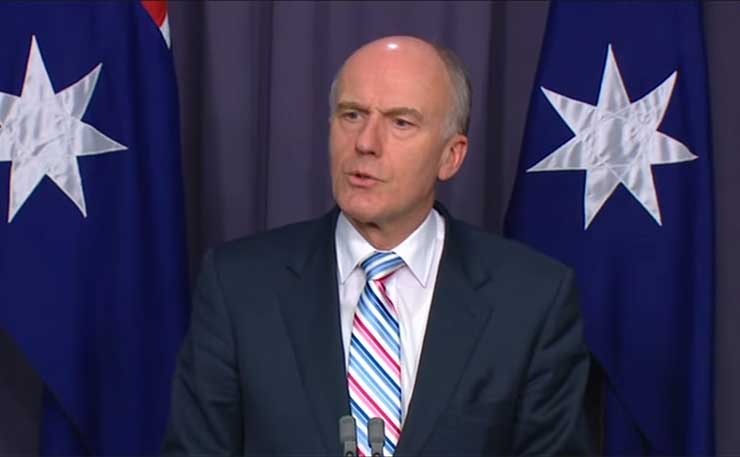The Senate has rejected an Abbott government push to resurrect the Australian Building and Construction Commission, a Howard-era industry watchdog which enjoyed extraordinary powers but was scrapped by the Labor government in 2012.
The body was established in the wake of the Cole Royal Commission, which found in 2003, at the time Tony Abbott was Workplace Relations Minister, that the building and construction industry was plagued by a culture of lawlessness and intimidation.
The resulting Australian Building and Construction Commission was granted extraordinary powers, including powers to interrogate workers and union officials who were denied the right to silence, and was billed as the tough cop on the beat needed to bring the construction industry to heel.
It also isolated building and construction workers by allowing for higher penalties purely by virtue of the industry workers were employed in and broadened the range of circumstances which would attract penalties.
Earlier today Labor teamed up with the Greens and key crossbenchers to prevent the Abbott Government from exhuming the body, which would have forced construction industry participants to adhere to a ‘Building Code’ to be drawn up by the minister.
The decision has been welcomed by the Construction, Forestry, Mining and Energy Union, with National Construction Division Secretary Dave Noonan slamming the legislation as “undemocratic and unnecessary”.
“There are industrial laws that cover all workers in Australia, and construction workers should not be subject to different laws,” Noonan said.
Opposition Employment Spokesperson Brendan O’Connor agreed, arguing that “the ABCC has powers that are excessive, undemocratic and unwarranted in terms of regulating civil laws”.
“Any allegation of serious crime that happens in the workplace by an employer, by an employee, or their representatives, should be investigated by crime-fighting agencies,” O’Connor said.
Labor, the CFMEU and the Greens all dismissed the Abbott government’s push to bring back the industry watchdog as one part of a broader industrial relations stance widely seen as punitive and anti-worker.
Noonan said the union was happy to work with all comers, including the Abbott Government, so long as it drops its “divisive and biased approach” and instead starts to “work in the interests of the workers and businesses who make a living in the construction industry”.
But Employment Minister Eric Abetz said the government will seek to re-engage key crossbenchers in an effort to see the legislation through the Senate, claiming that “no objective observer can deny there is an endemic problem of industrial unlawfulness in this industry”.
Abetz said that “the litany of court judgements and fines against the CFMEU for repeated and unrepentant breaches of the law” provided proof that issues identified by the Cole Royal Commission more than a decade ago persist.
“Since 2005, the courts have imposed fines of over $6.1 million on CFMEU-related unions and officials for proven breaches of the law,” Abetz said.
“This has not been enough to deter the CFMEU from repeated breaches of industrial laws; the current system is simply not strong enough to be effective.”
Abetz accused Senators who voted against the government’s Bill of “choosing to overlook the rampant unlawfulness in the construction industry” and suggested donations from unions to the Labor Party and the Greens may have influenced their decision-making.
However, in a submission to government last year the Australian Law Council raised concerns — similar to those of the Greens, CFMEU and Labor — over the fact that the ABCC inherently involved flouting fundamental principles of justice.
“… even from a preliminary consideration of the [Bill], it is clear that a number of features of the Bill are contrary to rule of law principles and traditional common law rights and privileges such as those relating to the burden of proof, the privilege against self incrimination, the right to silence, freedom from retrospective laws and the delegation of law making power to the executive,” the submission reads.
Donate To New Matilda
New Matilda is a small, independent media outlet. We survive through reader contributions, and never losing a lawsuit. If you got something from this article, giving something back helps us to continue speaking truth to power. Every little bit counts.




